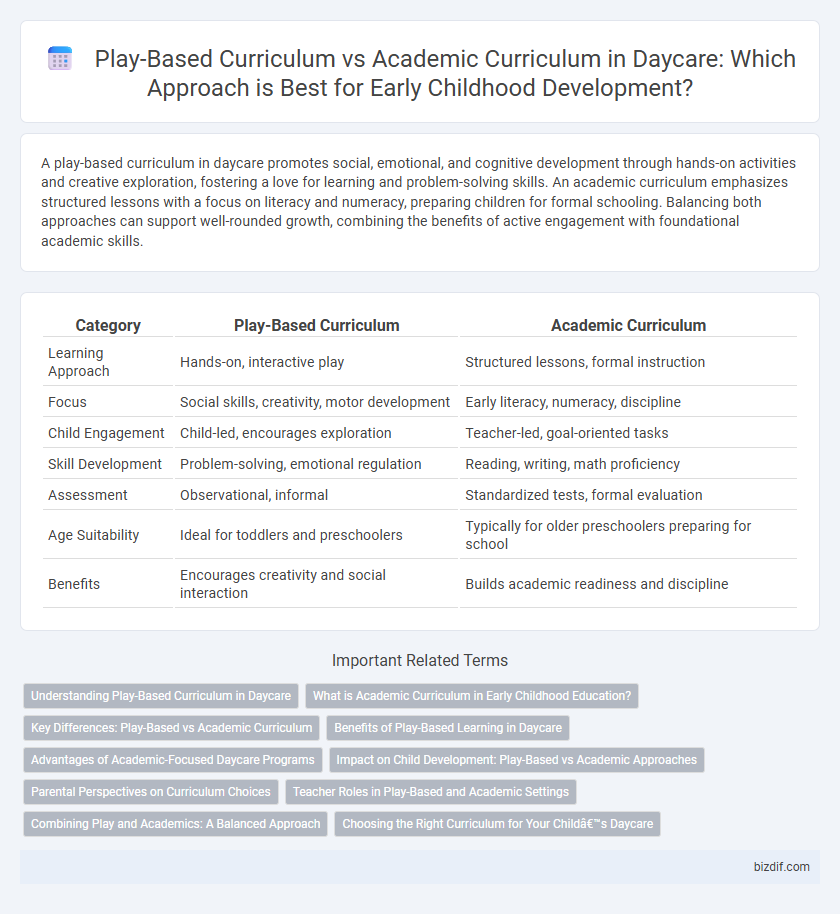A play-based curriculum in daycare promotes social, emotional, and cognitive development through hands-on activities and creative exploration, fostering a love for learning and problem-solving skills. An academic curriculum emphasizes structured lessons with a focus on literacy and numeracy, preparing children for formal schooling. Balancing both approaches can support well-rounded growth, combining the benefits of active engagement with foundational academic skills.
Table of Comparison
| Category | Play-Based Curriculum | Academic Curriculum |
|---|---|---|
| Learning Approach | Hands-on, interactive play | Structured lessons, formal instruction |
| Focus | Social skills, creativity, motor development | Early literacy, numeracy, discipline |
| Child Engagement | Child-led, encourages exploration | Teacher-led, goal-oriented tasks |
| Skill Development | Problem-solving, emotional regulation | Reading, writing, math proficiency |
| Assessment | Observational, informal | Standardized tests, formal evaluation |
| Age Suitability | Ideal for toddlers and preschoolers | Typically for older preschoolers preparing for school |
| Benefits | Encourages creativity and social interaction | Builds academic readiness and discipline |
Understanding Play-Based Curriculum in Daycare
A play-based curriculum in daycare centers emphasizes child-led activities that foster creativity, problem-solving, and social skills through interactive and imaginative play. This approach supports developmental milestones by integrating learning with hands-on experiences, promoting cognitive, emotional, and physical growth naturally. Research highlights that play-based curricula enhance language acquisition and executive function, making it a foundational strategy for early childhood education.
What is Academic Curriculum in Early Childhood Education?
An academic curriculum in early childhood education emphasizes structured learning goals in literacy, numeracy, and cognitive skills development, tailored to preschool-aged children. It incorporates systematic instruction, assessments, and skill-building activities designed to prepare children for formal schooling. This approach prioritizes measurable academic outcomes and foundational knowledge in subjects like reading, writing, and math.
Key Differences: Play-Based vs Academic Curriculum
Play-based curriculum emphasizes child-led exploration, social interaction, and hands-on learning, promoting creativity and emotional development through interactive activities. Academic curriculum focuses on structured lessons, memorization, and skill acquisition in subjects like math and literacy, aiming to prepare children for formal schooling. Key differences include the approach to learning--play-based encourages discovery and motivation, while academic stresses predefined outcomes and cognitive skills.
Benefits of Play-Based Learning in Daycare
Play-based learning in daycare promotes cognitive development, problem-solving skills, and social-emotional growth through interactive activities. This approach enhances creativity, language acquisition, and fine motor skills by engaging children in hands-on, exploratory play. Research shows that play-based curricula foster intrinsic motivation and adaptability, creating a strong foundation for lifelong learning and academic success.
Advantages of Academic-Focused Daycare Programs
Academic-focused daycare programs promote early cognitive development by introducing structured learning activities that improve literacy, numeracy, and critical thinking skills. These programs prepare children for a smoother transition to formal schooling by familiarizing them with classroom routines and academic expectations. Research shows that children in academic-focused settings often demonstrate higher school readiness and improved long-term academic performance.
Impact on Child Development: Play-Based vs Academic Approaches
Play-based curriculum enhances child development by promoting creativity, social skills, and emotional regulation through interactive and imaginative activities. Academic curriculum focuses on structured learning, improving cognitive abilities like literacy and numeracy, but may limit opportunities for spontaneous problem-solving and social interaction. Balancing both approaches supports holistic growth, integrating foundational academic skills with essential developmental competencies.
Parental Perspectives on Curriculum Choices
Parents often prioritize a play-based curriculum in daycare settings for its emphasis on social, emotional, and cognitive development through interactive and imaginative activities. Conversely, some parents prefer an academic curriculum that promotes early literacy and numeracy skills to prepare children for formal schooling. Understanding parental perspectives reveals a growing demand for balanced programs that integrate play with structured learning to support holistic child development.
Teacher Roles in Play-Based and Academic Settings
In play-based curricula, teachers act as facilitators, guiding children's exploration and encouraging creativity through hands-on activities that support social and emotional development. In academic settings, teachers primarily deliver structured lessons focused on cognitive skills, assessment, and knowledge acquisition to meet specific learning standards. Both roles require adapting strategies to nurture growth, but play-based teachers emphasize child-led discovery while academic teachers prioritize curriculum goals and measurable outcomes.
Combining Play and Academics: A Balanced Approach
A balanced daycare curriculum integrates play-based and academic approaches to foster holistic child development, enhancing cognitive, social, and emotional skills through interactive learning. Play encourages creativity and problem-solving, while structured academic activities build foundational literacy and numeracy. Combining these methods supports active engagement and adaptable learning, preparing children for future educational success.
Choosing the Right Curriculum for Your Child’s Daycare
Choosing the right curriculum for your child's daycare involves weighing the benefits of a play-based curriculum against an academic curriculum. A play-based curriculum promotes social, emotional, and cognitive development through interactive learning and creative play, fostering essential life skills and curiosity. In contrast, an academic curriculum focuses on early literacy, numeracy, and structured learning, preparing children for formal education with a strong foundation in core concepts.
Play-based curriculum vs academic curriculum Infographic

 bizdif.com
bizdif.com